Now that we are in June, I thought I would highlight some of the forthcoming events involving Kent History Postgraduates and others associated with the CKHH before I report on Jason Mazzocchi’s presentation to the KHP group today (Wednesday). I’m going to keep this blog shorter because last week’s covered two events, including the Becket Lecture which is a flagship occasion.
Starting with the MEMS Fest at the University of Kent, Jason with Kieron Hoyle and Peter Joyce will be presenting a panel at this popular celebration of research into Medieval and Early Modern Studies which will be taking place on the 13th and 14th June. The programme has just been released and they will be speaking on Saturday morning in the first session at 9am: https://memsfestival.wordpress.com/ . From my perspective this is great because it means I’ll be able to go to hear them speak before heading to Faversham at lunchtime. For to mark the 800th year centenary of the definitive Magna Carta, Henry III being then old enough in 1225 to issue it in his own name, Faversham Charters & Magna Carta will be holding a Magna Carta Anniversary series of events on the Saturday: https://favershamcharters.org/events/ and among these events at 2pm I’ll be speaking on ‘Living and Dying in Medieval Faversham’. I understand from the organiser that the talk is now fully booked which is great for all concerned. This may also be true for the earlier talk which will be given by Sue Lamberton on the use of silk for medieval charters but if interested do check out the link above because that will have details.
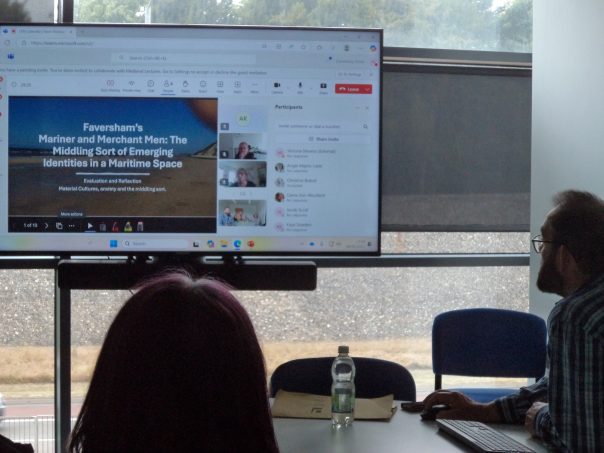
The following week, Dr Claire Bartram is busy organising an afternoon to celebrate projects involving people linked to the Centre after the very successful event last summer. Hopefully the weather will be equally good and it will be a chance for people to make contacts and strengthen ties as happened last year.
Moving to July, firstly Lizzie Burton will be giving that month’s presentation to the Kent History Postgraduates on Wednesday 2nd as a trial run for her paper at the Social History Society conference the following week which will be taking place at the Black Country Living Museum in Dudley: https://socialhistory.org.uk/events/conference/ . Also speaking at the conference will be another Kent History Postgraduate, Abi Kingsnorth and Lizzie’s and Abi’s supervisor Dr David Hitchcock.
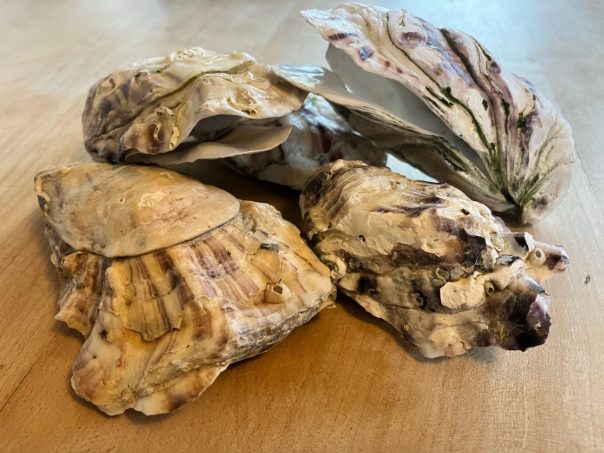
Back in Canterbury at CCCU and the 2nd to the 5th July, it will be the Gender and Medieval Studies annual conference, the theme this year being ‘Gender: Charity and Care’ https://medievalgender.co.uk/ and for bookings, please see: https://shop.canterbury.ac.uk/product-catalogue/faculty-of-arts-humanities/school-of-humanities This year the conference is followed on the Saturday by the ‘Canterbury Medieval Pageant’. I believe this year the CKHH will be at St Mildred’s church, but I don’t know anything beyond that and then on Sunday 6th July it will be the annual commemoration service of St Thomas More at St Dunstan’s church. The service begins at 7.30pm and this year the address will be given by Professor Robert Bartlett (Professor Emeritus at the University of St Andrew’s). There will be refreshments after the service and all are welcome to attend.
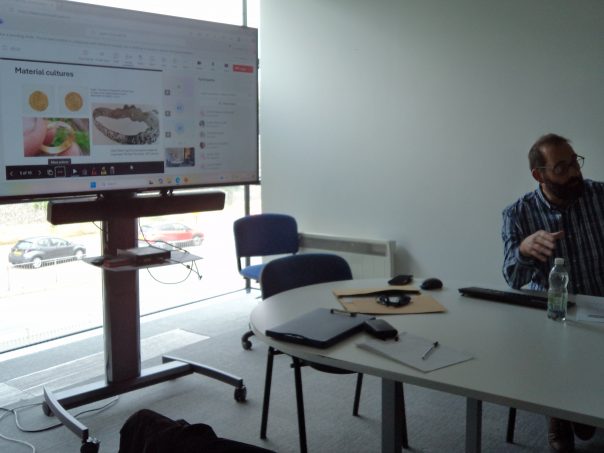
To Jason’s presentation today and as he said at the start, he wanted to take the opportunity to share his evaluation and reflections on the several presentations he has given in the last year as a way of thinking about how to use audience feedback to enhance his research. Moreover, because these presentations had been to different types of audience, from the postgraduate MEMS Fest 2024, the workshop at Queen Mary’s London University and the new maritime history researchers conference at Hull to the two study days at Dover Museum as part of the Kent Maritime Communities project, he had received a very broad range of comments and questions. Some of these had led him to new archives, such as those of the London Leathersellers’ Company, to explorations of dramatic texts, including ‘Arden of Faversham’, to further investigations of probate materials, as well as the artefacts themselves, including material culture in the form of maps. While not all had produced ideas that will make it into his thesis, some being interesting but ‘parked’ to be re-examined post-PhD, they are all important as part of the doctoral journey as he assesses how the thesis will come together, what will be the final case studies and how the argument will be sustained that underpins the whole analysis.
Taking this as his starting point and that the oyster disputes involving Faversham form a key case study, Jason discussed his three areas for today: material cultures, anxiety and the ‘middling sort’. As he has discussed previously, the idea of using gold coins to form rings of remembrance, which at times might include an inscription, thereby bringing in the value of the written word, offers a fruitful example in terms of material culture alongside the use of textual evidence – such rings are occasionally mentioned in wills. Such an interdisciplinary approach is helpful, especially when coupled with theoretical ideas from sociology and social anthropology, in our search for cultural meaning.
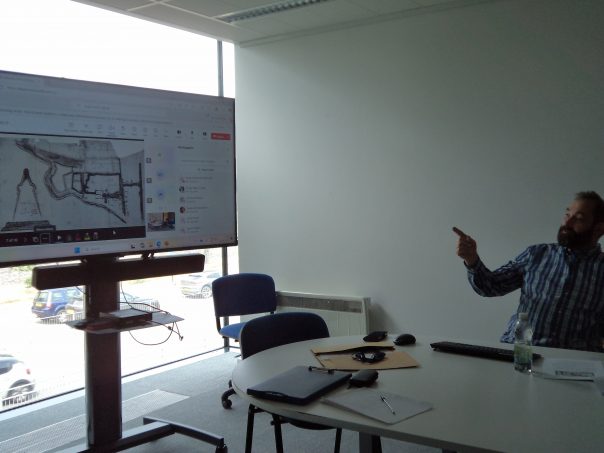
Maps too can be seen as material culture, but they can also be seen in terms of his second theme, the idea of anxiety as experienced by some members of the middling sort exemplified in, for example, ‘Arden of Faversham’. The sense of lost control whether of his wife or the ring he had given her at their wedding, she having given it to her lover Moseby, produces in Arden feelings of anxiety, loss of face and that early modern dread of gossip – he will be talked about by his neighbours. For amongst other considerations, Moseby is viewed as being of lower status by Arden for whereas Arden sees and is seen by others as a gentleman, his rival was no more than an upstart botcher who has wormed him his way into the service of a member of the aristocracy.
Keeping with anxiety but drawing on the material culture of maps, in addition to the maps of the oyster grounds in terms of the disputes, Jason has found a map showing the town in the 1590s. While this has the London to Canterbury road, the emphasis is on the creek – the significance of waterborne transport for both goods and people. For this is how the streets of Faversham on the map are orientated, the focal point of the town having shifted away from that of medieval Faversham. Returning to Arden to, this shift is evident as in the play he visits the quay to see to the unloading of his cargo, an activity in keeping with his status as a prosperous merchant and landholder. Such trade was the lifeblood of the town and port of Faversham, offering commercial opportunities, but equally networking opportunities both horizontally and vertically across society. Geographically too, for the shipping of grain and malt, as well as other commodities to London, but also overseas, is something that Jason has been investigating in the records, mirroring Arden’s activities in the play.
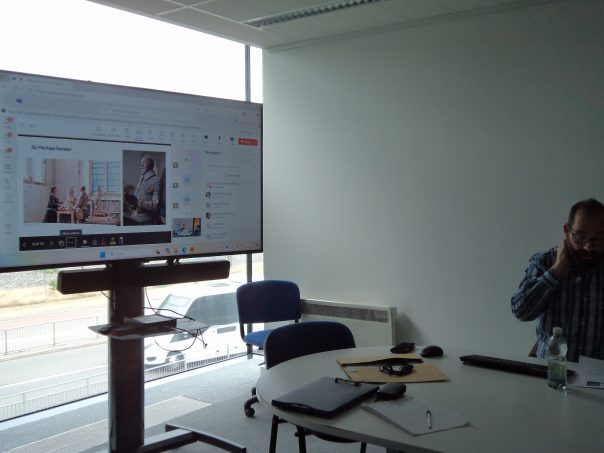
This brought into sharper focus just why Jason is interested in the middling sort and he discussed Sir Michael Sondes using his and his parents’ funeral monument in Throwley church. For Sir Michael, while a landowner was equally tied into credit and debt networks, as well as those based on kinship and place. His social standing and that of his father exemplified by how they are depicted – markers for their own and subsequent generations from now to eternity. All these aspects, Jason sees as aiding his exploration of the civilising process that he sees as part of this transformational process around 1600.
His presentation provoked a series of comments and questions from those in the room and online, and further discussion took place when we adjourned to the café afterwards. So thanks Jason, it obviously worked as a thought-provoking ‘research in progress’ presentation.
 Centre for Kent History and Heritage
Centre for Kent History and Heritage Sheila Sweetinburgh
Sheila Sweetinburgh 2454
2454

